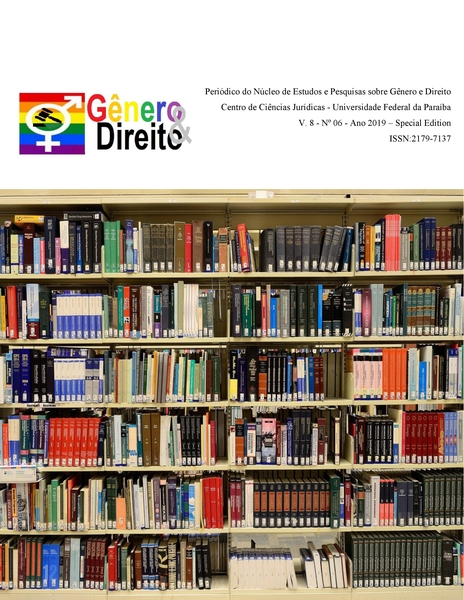IMPROVING FINANCIAL LITERACY OF THE CHILDREN AND TEENAGERS IN THE RUSSIAN FEDERATION
DOI:
https://doi.org/10.22478/ufpb.2179-7137.2019v8n6.49201Palavras-chave:
Russian Federation, financial literacy of the population, educational programs in the field of financial literacy of children and youthResumo
The issues of improving the financial literacy of the population are currently receiving a lot of attention both at the international and national levels. Of particular relevance are financial literacy issues for the Russian Federation. Due to the peculiarities of the country's historical development, for most citizens of Russia, issues of personal financial planning, the principles of the functioning of financial markets, the possibility of investing savings remain obscure, as a result of this, the population can not fully use modern financial products and services, does not know their rights in the financial market and unable to protect them in accordance with the law. It should be noted that the problem of a low level of financial literacy of citizens is a problem at the national level, since a low level of financial literacy negatively affects the personal well-being of citizens, their financial potential, and accordingly prevents the development of the financial market, inhibiting investment processes in the economy. Under these conditions, increased interest in issues of financial education and financial literacy of citizens of the Russian Federation is logical and, since 2011, the World Bank and the Ministry of Finance of the Russian Federation have actively implemented a project “Promoting Improving the Level of Financial Literacy of the Population and Development of Financial Education in the Russian Federation”. One of the most important areas of the project is to increase the financial literacy of children and youth. Since the start of the project, a range of training materials has been developed in this area, professional development of school teachers, teachers of orphanages, college teachers is provided, and weeks of financial literacy are held. The result of the events was a significant increase in the level of financial literacy of Russian schoolchildren. In this regard, the experience of the Russian Federation in improving financial literacy of children and youth is of great interest.Downloads
Não há dados estatísticos.
Referências
J. Bayuk, S.A.Altobello, “Can gamification improve financial behavior? The moderating role of app expertise”, 2019, International Journal of Bank Marketing, Issue 37(4), pp. 951-975
N.V. Dulina, D.V. Moiseeva, Financial literacy as a result of the process of financial education (on the example of Volgograd region),
P. Farías, “Determinants of knowledge of personal loans' total costs: How price consciousness, financial literacy, purchase recency and frequency work together”, 2019, Journal of Business Research, Issue 102, pp.212-2019
K.Karakurum-Ozdemir, M.Kokkizil, G. Uysal, “Financial Literacy in Developing Countries”, 2019, Social Indicators Research, Issue 143(1), pp. 325-353
K.T.Kim, , S.G.Anderson, M.C. “Financial Knowledge and Short-Term and Long-Term Financial Behaviors of Millennials in the United States”, 2019, Journal of Family and Economic Issues, Issue 40(2), pp. 194-208
R. Kuntze, C.Wu, B.R.Wooldridge, Y.-O “Whang, “Improving financial literacy in college of business students: modernizing delivery tools”, 2019, International Journal of Bank Marketing, Issue 37(4), pp. 976-990
A. Lusardi, “Financial literacy and the need for financial education: evidence and implications”, 2019, Swiss Journal of Economics and Statistics, Issue 155(1)
L.Nadolny, , J.Nation, J.Fox, “Supporting motivation and effort persistence in an online financial literacy course through game-based learning”, 2019, International Journal of Game-Based Learning, Issue 9(3), pp. 38-52
M.F.Pang, “Enhancing the generative learning of young people in the domain of financial literacy through learning study”, 2019, International Journal for Lesson and Learning Studies, Issue 8(3), pp. 170-182
Official website of The Organization for Economic Co-operation and Development, 2019. – Access mode: http://www.oecd.org
Official website of the Federal methodical center, 2019 - Access mode: https://fmc.hse.ru/
N.V. Dulina, D.V. Moiseeva, Financial literacy as a result of the process of financial education (on the example of Volgograd region),
P. Farías, “Determinants of knowledge of personal loans' total costs: How price consciousness, financial literacy, purchase recency and frequency work together”, 2019, Journal of Business Research, Issue 102, pp.212-2019
K.Karakurum-Ozdemir, M.Kokkizil, G. Uysal, “Financial Literacy in Developing Countries”, 2019, Social Indicators Research, Issue 143(1), pp. 325-353
K.T.Kim, , S.G.Anderson, M.C. “Financial Knowledge and Short-Term and Long-Term Financial Behaviors of Millennials in the United States”, 2019, Journal of Family and Economic Issues, Issue 40(2), pp. 194-208
R. Kuntze, C.Wu, B.R.Wooldridge, Y.-O “Whang, “Improving financial literacy in college of business students: modernizing delivery tools”, 2019, International Journal of Bank Marketing, Issue 37(4), pp. 976-990
A. Lusardi, “Financial literacy and the need for financial education: evidence and implications”, 2019, Swiss Journal of Economics and Statistics, Issue 155(1)
L.Nadolny, , J.Nation, J.Fox, “Supporting motivation and effort persistence in an online financial literacy course through game-based learning”, 2019, International Journal of Game-Based Learning, Issue 9(3), pp. 38-52
M.F.Pang, “Enhancing the generative learning of young people in the domain of financial literacy through learning study”, 2019, International Journal for Lesson and Learning Studies, Issue 8(3), pp. 170-182
Official website of The Organization for Economic Co-operation and Development, 2019. – Access mode: http://www.oecd.org
Official website of the Federal methodical center, 2019 - Access mode: https://fmc.hse.ru/
Downloads
Publicado
2019-11-26
Como Citar
M. TUFETULOV, A. .; M. SHAVALEYEVA, C. .; M. SABITOVA, N. .; I. ABDREEV, T. . IMPROVING FINANCIAL LITERACY OF THE CHILDREN AND TEENAGERS IN THE RUSSIAN FEDERATION. Gênero & Direito, [S. l.], v. 8, n. 6, 2019. DOI: 10.22478/ufpb.2179-7137.2019v8n6.49201. Disponível em: https://periodicos.ufpb.br/index.php/ged/article/view/49201. Acesso em: 31 mar. 2025.
Edição
Seção
Seção Livre

